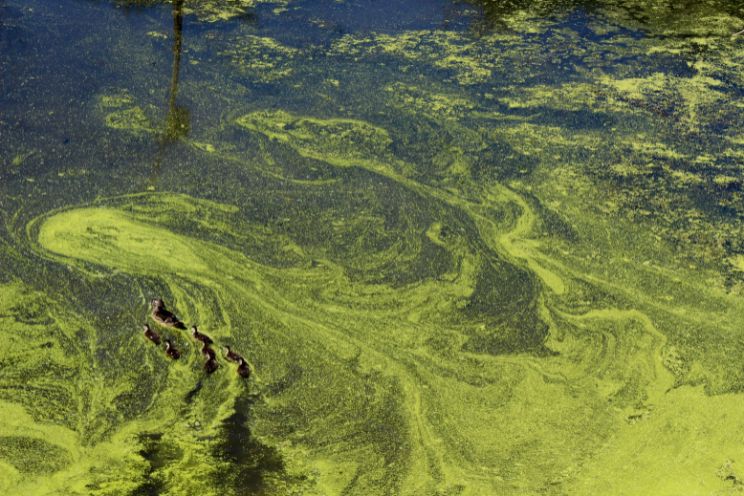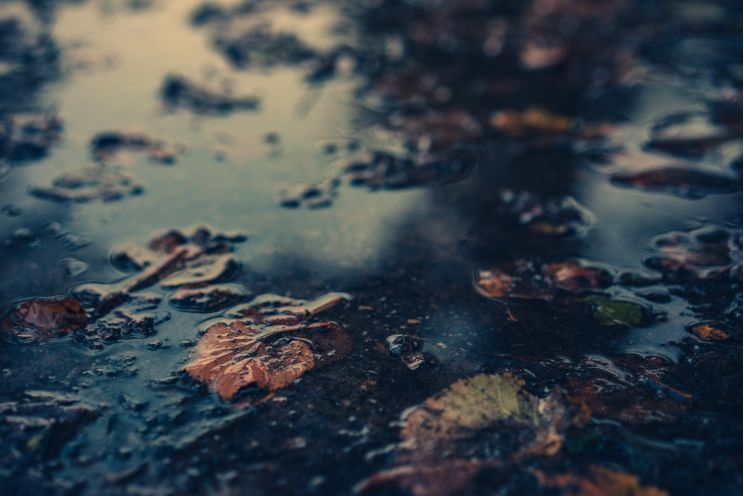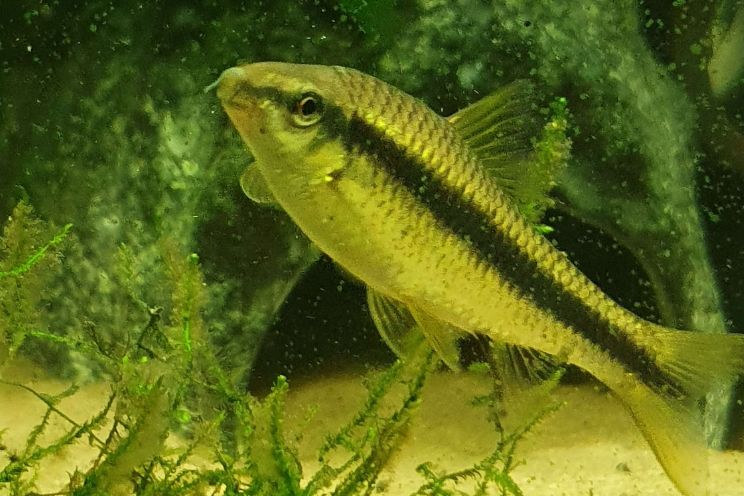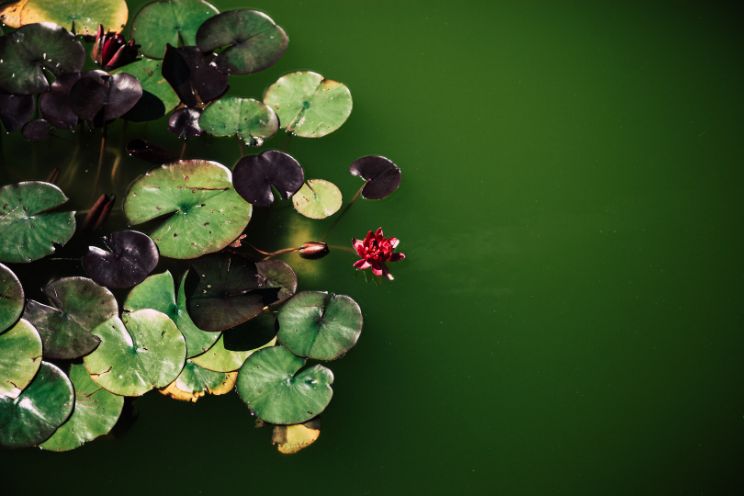Green water is a common occurrence in ponds, as a pond can provide an ideal environment for it to grow.
Your pond may become completely green and lose its clarity, even midway through winter, making maintenance difficult and preventing you from seeing your fish.
But what is green water? How is it caused? Is it good or bad? Should I get rid of it? If so, how? And are there any benefits it brings?

What is green pond water?
Green water is a loose term for any species of particulate algae – this is any algae that floats in the water column, giving the pond or aquarium, a green foggy appearance.
In freshwater, this is caused by tiny single celled plant-like organisms which consume light and nutrients from the water, and produce oxygen.
In saltwater, green water is commonly caused by plankton, which are all tiny marine animals and plants, also known as infusoria, which feed on passing nutrients from ocean currents and seaways.
What is pond algae?
Pond algae describes any algae that can grow in an outdoor pond and survive; some of these algae types will also be encountered in an aquarium.
We actually have a full guide to pond algae.
However, not all the species you may encounter will cross over, there are many algaes you can grow in a tank that will not grow outdoors in your climate.
The reverse is also true, and some of the algaes which grow outside, such as blanketweed, will not grow in your home aquarium.
Pond algaes typically grow very quickly, they can often encase plants and your filtration system and work along with the seasons, with summer being the time where the most algae is present.

Why has my pond water turned green over winter?
As mentioned, there are many species of algae that come under the name “particulate algaes” or “green water” and some of these can survive in very cold weather.
Some species of diatom algae are extremely hardy and can survive all year round, through blistering heats in summer to freezing sub zero temperature drops in winter.
While it is more common for green water to appear in summer, it is entirely possible and normal for it to grow during the winter time.

Causes of green pond water

Excess Nutrients
Green water will form in winter if there are excess nutrients left over in the pond for it to take advantage of. The algae will also grow if the pond receives plenty of sunlight throughout the day.
What can make life easier for green algae to take over in winter is the reduced pond activity. Green water tends to like living in water with low movement and low levels of filtration.
If you turn off your pond filter during winter or have a pond with low water movement, then this could be one of the causes.
Dead Leaves
Another cause of green water in winter is dead leaves.
Dead leaves will enter your pond in the fall, and over time will decompose, they will leak tannins and nutrients into the water column, this sets the perfect conditions for green water to grow.
Lack of Activity
Another large contributing factor to green water in winter is the lack of activity from fish, invertebrates, infusoria and all the cleanup crew.
Because the water is cold, these animals will either die off or enter a dormant state during winter, and so they don’t break down food and nutrients as they normally should.
Plants also become dormant during winter time and thus do not consume nitrates and a number of other minerals that particulate algae also feed on.
This leaves lots of excess nutrients and food open in the water for the algae to take advantage of.

What are the common causes of green pond water?
While anyone can get green water and will probably encounter it at some point, some people get it a lot more often than others.
This is because each person has a different setup, and some pond builds are more inviting to green algae than others.
Here are some conditions that green algae tends to do well in:
- Slow moving or stagnant water
- Areas with large amounts of sunlight
- Ponds with no cleanup crew (snails / scuds etc)
- Ponds that receive lots of food
- Highly stocked ponds
- Ponds with less plants and more nutrients
Will green pond water clear on its own?
There are many species of green particulate algae that all have different living requirements, and levels of hardiness, some will only survive during the summer months and will die off in autumn.
- Others can survive all year and will block up your pond.
It is hard to identify each species without a microscope, but the chances are, it will likely survive through autumn and winter, but sometimes it will just die off and clear by itself.

How long does it take for green pond water to clear?
This is heavily dependent on your situation; sometimes it can clear in days, weeks, months – it varies heavily.
Factors that apply to this are:
- If you are taking measures to combat green water
- The time of year
- The amount of available nutrients and light
- Amount of filtration and water movement
- Frequency of maintenance and water changes
If you take measures to remove green water, then depending on your methods, the time will change dramatically.
If you use barley to remove green water, then it can take about a week or more before you start to see any difference.
Chemical treatments can clear your pond overnight, but they aren’t always safe for pond life, so be very careful when using them.

Is green pond water bad for fish?
Not necessarily, green water will not harm your fish. In fact, it is actually very good for rearing fry and baby fish, as the green water provides food for infusoria and tiny creatures which the fry feed on.
Many fish breeders actively seek to produce green water sometimes as it is great for rearing live food cultures like daphnia, which can be fed to baby fish.
The only time green water would be bad for fish, is if it’s a specific species that clogs up the water and makes it stagnant, producing toxic gases and changing the water chemistry to become uninhabitable, or that it simply stops you from seeing the fish and prevents you from spotting disease.
The former is very unlikely to happen; algae like this usually only grows in places where sewage leaks out into rivers and where the water is very rich in ammonia.
So the only real danger green water opposes to the average pond is that it stops you from seeing the fish.
This could prevent you from spotting bullying, disease, damage and stops you from acting on it early.
Is green water good for goldfish?
Green water can be very good for baby fish and rearing fry as it provides food for small creatures and infusoria which the fry feed on.
Does pond algae die in winter?
As previously stated, it is dependent on the species of algae that is making the water turn green. Some can survive sub zero temperatures, whereas others are more tropical and can only live in warm waters.
Either way, the likelihood of the algae dying off during winter varies.
In some cases it will die off, but most ponds with green or murky water can remain like that throughout winter.
How to clear green pond water
- There are a number of ways to remove green water, the first and most simple way is to do more water changes.
Doing water changes on a pond isn’t easy for everyone, but for most ponds, the simple fix of performing regular water changes is cheap and easy enough to keep green water at bay.
- The second most commonly used method is through using barley straw.
This is a natural method which has been used for many many years to deter green water.
As barley breaks down, it releases chemicals into the pond water, which inhibits the further growth and spread of algae. While it may not kill the algae directly, it stops it from reproducing and eventually it will die off.
- The next method is through the means of chemicals.
Each one is different, but only some are safe for fish and invertebrates, so be very careful when using them, and read the bottles carefully.
Chemicals are the most effective means of removing green water, they can do it overnight, but they can be risky to use.
How to prevent green pond water
Preventing green water comes under your regular pond maintenance, as it is mostly caused by neglecting your setup.
Regular water changes, filter cleans, appropriate feeding schedules, cleaning of debris and so on, are all solid methods of preventing green water and should all be regular activities in pond maintenance anyway.
Taking accurate measures to maintain your pond during all seasons is also key, many ponds experience large algae blooms and green water in spring and summer due to the warmth and increased amount of sunlight.
In summer, using a cover to block out the sun, planting marginals or trees around the pond to provide shade, and reducing the level of light, is a good way to prevent intense algae blooms.
We usually recommend that a pond receives around 6 hours of sunlight a day, any more would create too much nutrients for the algae.
During winter time, it is key to remove any dead leaves or organic debris, as these are the number one cause of nutrient imbalances and green water blooms during winter.

All the sections are explained beautifully. Keep sharing such articles.